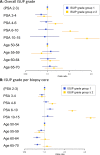Are Prostate Specific-Antigen (PSA) and age associated with the risk of ISUP Grade 1 prostate cancer? Results from 72 996 individual biopsy cores in 6 083 men from the Stockholm3 study
- PMID: 31194822
- PMCID: PMC6564040
- DOI: 10.1371/journal.pone.0218280
Are Prostate Specific-Antigen (PSA) and age associated with the risk of ISUP Grade 1 prostate cancer? Results from 72 996 individual biopsy cores in 6 083 men from the Stockholm3 study
Abstract
Background: Knowledge about the relationship between PSA, age and ISUP grade group (ISUP) 1 prostate cancer can improve clinical and biological understanding of prostate cancer. We aimed to investigate the associations between PSA and age and the risk of ISUP 1 and ISUP ≥ 2 prostate cancer, respectively.
Methods: We included 6 083 men aged 50-69 biopsied with a total of 72 996 individual biopsy cores from the prospective and population based Stockholm3 diagnostic study. We computed the risk of ISUP 1 and ISUP ≥ 2 prostate cancer and their respective associations with PSA and age. Since lower Gleason grades often are masked by higher grades in the overall Gleason score, we compared associations both for overall Gleason score and for Gleason on individual biopsy cores.
Results: ISUP 1 prostate cancer was not significantly associated with PSA at diagnosis: odds ratios ranged from 0.82 (95%CI: 0.68-1.00) for PSA 3-4 ng/mL, 0.96 (95%CI: 0.79-1.16) for PSA 4-6 ng/mL, 0.95 (95%CI: 0.75-1.21) for PSA 6-10 ng/mL, and 0.92 (95%CI: 0.58-1.45) for PSA 10-15 ng/mL compared with PSA 2-3 ng/mL. Age was not significantly associated with risk of ISUP 1 cancer. This contrasts to the strong relationship between ISUP ≥ 2 prostate cancer and its respective associations with PSA and age.
Conclusions: We find no significant association between the risk of ISUP 1 prostate cancer and PSA and age at diagnosis indicating that PSA contribution from ISUP 1 prostate cancer is closer to that of benign prostate tissue than to that of ISUP ≥ 2 prostate cancer.
Conflict of interest statement
We declare the following competing interests: Henrik Grönberg has five prostate cancer diagnostic related patents pending, has patent applications licensed to Thermo Fisher Scientific, and might receive royalties from sales related to these patents. Martin Eklund is named on four of these five patent applications. Karolinska Institutet collaborates with Thermo Fisher Scientific in developing the technology for the Stockholm3 prostate cancer diagnostic prediction model(1. PROGNOSTIC METHOD FOR INDIVIDUALS WITH PROSTATE CANCER. Publication info:WO2014079874 (A1)2014-05-30; 2. METHOD FOR INDICATING A PRESENCE OR NON-PRESENCE OF AGGRESSIVE PROSTATE CANCER, Publication info:WO2014079865 (A1)2014-05-30; 3. METHOD FOR INDICATING A PRESENCE OR NON-PRESENCE OF PROSTATE CANCER IN INDIVIDUALS WITH PARTICULAR CHARACTERISTICS, Publication info:WO2018141828 (A1)2018-08-09; 4. METHOD FOR DETECTING A SOLID TUMOR CANCER, Publication info: WO2015137870 (A1)2015-09-17; 5. METHOD FOR INDICATING THE PRESENCE OR NON-PRESENCE OF PROSTATE CANCER, Publication info: WO2013172779 (A2)2013-11-21). Other authors declare: no support from any organization for the submitted work; no financial relationships with any organizations that might have an interest in the submitted work in the previous three years; no other relationships or activities that could appear to have influenced the submitted work. This does not alter our adherence to PLOS ONE policies on sharing data and materials.
Figures


References
Publication types
MeSH terms
Substances
LinkOut - more resources
Full Text Sources
Medical
Research Materials
Miscellaneous

